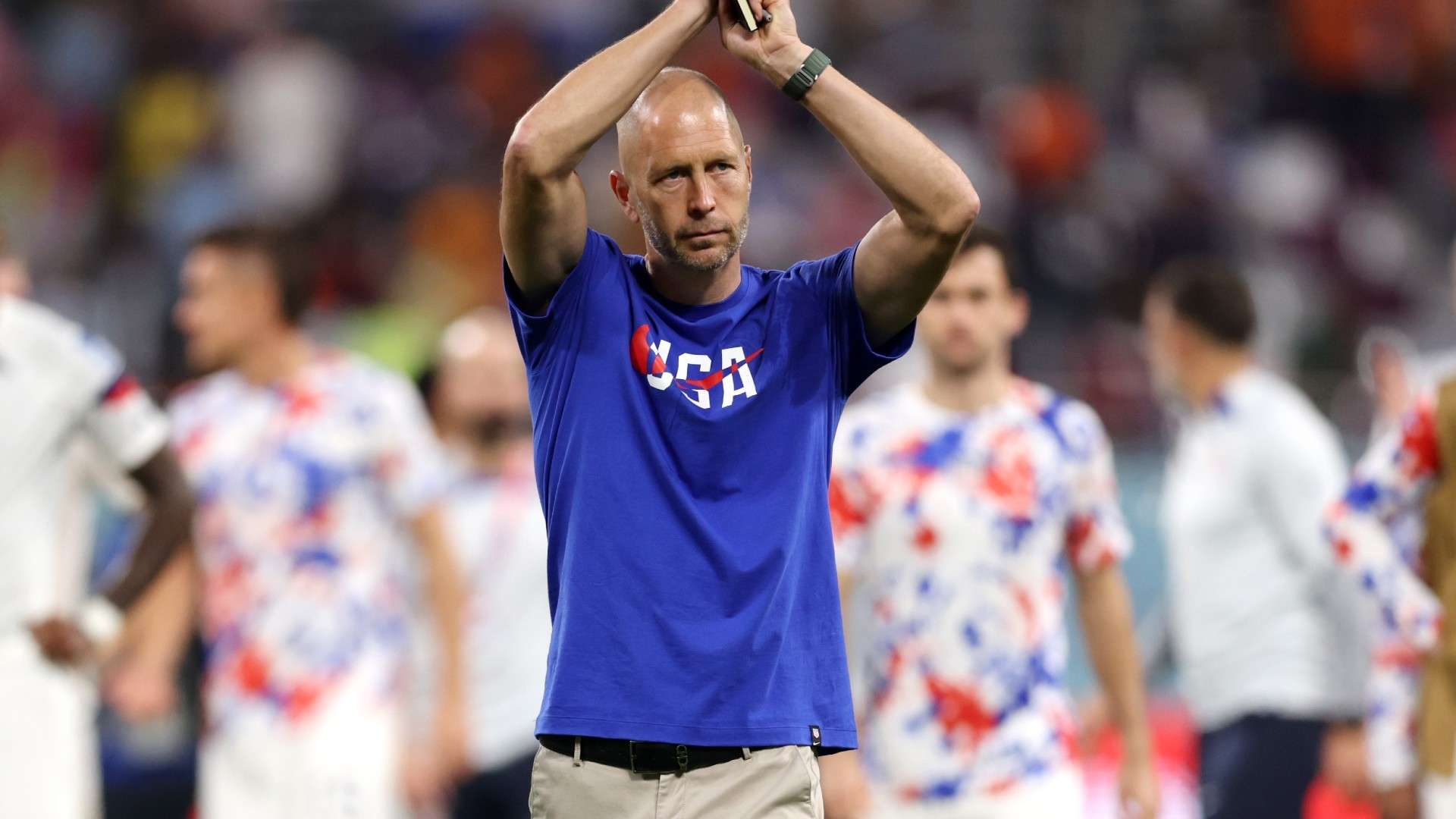In the moments after the final whistle blew, Gregg Berhalter acted like a man who knew it was over. He made his way around the field, hugging individual players, consoling them, and giving them a shoulder to cry on amid the emotion of it all.
It was, in fact, over thanks to the U.S. men's national team's 3-1 loss to the Netherlands. The question is what "it" is. Was Saturday just the end of a World Cup campaign, or the end of the Berhalter era?
In the coming days, that will be discussed ad nauseam, as coach's futures do so often after a World Cup.
There will be plenty of talk about whether or not Berhalter was the right coach to lead the U.S. into the 2022 World Cup, but more importantly, there will be plenty of talk about whether or not Berhalter is the right coach to lead the U.S. into the 2026 World Cup.
That is where we are now, looking toward the future. And as things stand, it isn't yet clear whether Berhalter will be a part of that future.
His contract, along with those of his staff, ends after this World Cup. A decision will have to be made, one way or another. And, just moments after the final whistle blew, he was asked about that decision, one that he apparently isn't quite ready to make.
"I've only been focused on the World Cup, achieving things with this group," he said after the loss. "In the next couple of weeks, I'll clear my head and think about what's next."
There will be plenty around American soccer that will say that the decision shouldn't be Berhalter's to make. They have a point.
Forget the criticisms, and there are those out there. The roster selection was questionable as were the substitutes. And what the heck happened with Gio Reyna? We'll find out someday.
 Getty/GOAL
Getty/GOALRegardless, second-cycle coaches rarely fare well on the international level. After four years, players often need a new message. The U.S. has seen it, first with Bruce Arena, then with Bob Bradley and, ultimately, with Jurgen Klinsmann, where initially positive results eventually came crashing down to end tenures in turmoil.
It's a syndrome often experienced by international coaches, particularly World Cup winners. There's a reason that France were applauded for being the first defending champions to escape the group stage since 2006. There's something to be said about things going stale when trying to catch lightning in a bottle twice.
And the fact is that the next cycle will be very different than this most recent one for the USMNT. From the moment he was hired, Berhalter's job was to introduce young players and get them ready for the international game. The job for 2026 will to take those young players and get them to a different level so that they can be considered genuine contenders on home soil.
Whatever you thought of the team's 2022 World Cup performance - and there are plenty that thought the U.S. underachieved - they'll say that there's no logical reason to bring Berhalter back.
There's no reason, they'll say, not to give players a new voice and new ideas. They will say that he'd built a culture, laid a foundation, brought along many good players, but that now it is time for someone new.
There will also be those that want him to stay, to continue on building a project that has helped earn the U.S. respect from all over the world. While Berhalter may not capture the hearts and minds of Twitter trolls, he has captured the admiration of the four coaches he faced in this tournament.
Gareth Southgate, Louis van Gaal, Rob Page and Carlos Quieroz all went out of their way to be complementary of Berhalter and his tactics. All pointed to how well-drilled the USMNT was and how they performed as a unit in ways that most national teams cannot.
Yes, Berhalter was outcoached by Van Gaal, but so have hundreds of other coaches. He's Louis van Gaal, for goodness sake. There's no shame in that, and the fact that Van Gaal said that there were things that the U.S. did to make his life difficult is a major compliment.
The opinions of men like Southgate and Van Gaal should not be discarded lightly. Despite what social media thinks, Berhalter has his admirers for good reason. In all four games, he gave the USMNT a chance to win and, tactically, set his team up well, even if there were aspects of his substitutions and roster selection that left a bit to be desired.
So there is reason to keep him and allow him to build on the foundation he's laid. It's something that several players said they would be open to.
"I would love for him to stay," said forward Jesus Ferreira, "but that's out of my control, He's done a really good job with the group and obviously you can see how the group responds to him."
All of that talk leaves out one big aspect of all of this: does Berhalter even want to stay? Lost in all the talk of whether he should or shouldn't stay on is the very idea of whether or not the man himself is ready to move on.
It is fairly easy to argue that Berhalter's skillset is better suited to a club environment, where it is easier to implement and tweak a system. International soccer is less about tactics and ideaology than many are willing to admit. Instead, World Cups are often defined by which team limits its mistakes.
And Berhalter would certainly have his suitors. He's impressed at the World Cup, with media in other countries taking notice of his work with the national team. He'd certainly have any job he wanted in MLS and, most likely, would be able to find a few good offers in Europe should he go that route.
We'll learn more in the coming weeks about what both Berhalter and the federation want. They may agree to keep the relationship going or both could agree it's time to part ways in a decision that could very well pay off for all involved.
Until that point, and likely after, the rumor mill will churn. Names like Jesse Marsch, Roberto Martinez and Marcelo Bielsa will be tweeted constantly for USMNT fans. If Berhalter does leave, the U.S. will have no shortage of candidates willing to jump at the opportunity to change American soccer in a home tournament.
If Saturday's defeat at Khalifa Stadium was Berhalter's swan song, he should leave with his head held high. He took over a program in ruins and built it into one of the 16 best national teams in the world. The team didn't go as far as he would have liked, but there's no doubt that this young group has come further than many could have dreamt of four years ago.
Give Berhalter credit for that. Whether he stays or goes, his fingerprints will be all over the 2026 World Cup as he laid the foundation for what American soccer could - and should - be.
"I think the hardest thing, as a coach, is to get everybody going in the same direction," said an introspective DeAndre Yedlin, "and I think he's done that very well. He's gotten everybody bought into the culture and that's the most important thing ."

